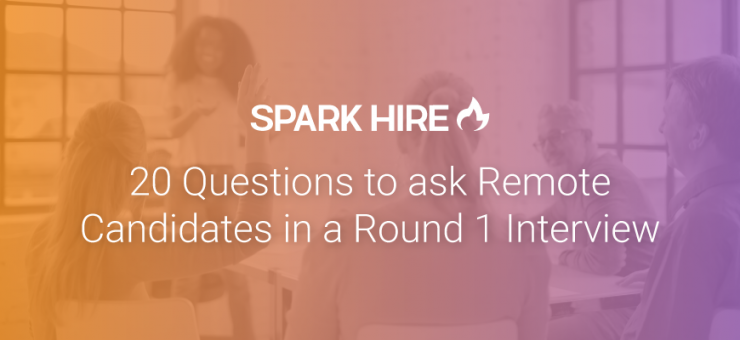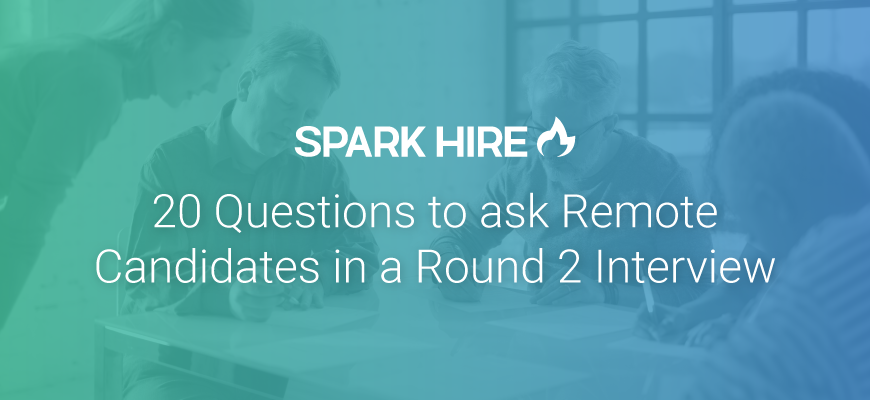With many roles staying remote (or providing more flex time), we asked hiring experts to shine light on the questions they ask candidates to determine the right fit for a remote role.
From how they collaborate with others to how they need their workspace setup to stay motivated to leadership style, and more, here are the questions that you can ask in a first-round interview to reveal the most successful remote hires for your team:
Kick it Off
Tell me about yourself.
 I find that the ‘old’ questions still apply, except now I pay less attention to what they say and more to how they say it. I am more likely to consider someone who understands the significance of the words they use and how they use them; someone who is mindful of the tone of their voice when responding to questions and making their point.
I find that the ‘old’ questions still apply, except now I pay less attention to what they say and more to how they say it. I am more likely to consider someone who understands the significance of the words they use and how they use them; someone who is mindful of the tone of their voice when responding to questions and making their point.
Mario Almonte, President at Herman & Almonte PR
How would you describe yourself in two sentences?

I’m trying to suss out if the candidate has the qualities that would make him/her a good remote employee. Are they honest, independent or detail-oriented? When someone only has a few words to describe themselves, they start with their strongest qualities. If they don’t have at least one dominant quality that would help them thrive in a virtual role, they are not fit for the job.
Reuben Yonatan, Founder and CEO at GetVoIP
Experience with Remote Work
Why do you want to work remotely?
 Some people tend to idealize the freedoms remote work can offer – like setting your own schedule, no more long commutes, pajama days etc. However, they also don’t often realize that it can result in an unhealthy work-life balance if not managed properly. Ask this question to get a better idea of how they think the job is going to operate.
Some people tend to idealize the freedoms remote work can offer – like setting your own schedule, no more long commutes, pajama days etc. However, they also don’t often realize that it can result in an unhealthy work-life balance if not managed properly. Ask this question to get a better idea of how they think the job is going to operate.
Deepak Shukla, Founder at Pearl Lemon
What is your ideal remote work setup?

I like to dig in to see how prepared people are for remote work. Candidates that have proven to be prepared have easy access to a printer, a comfortable chair, reliable internet, a camera, a good headset that blocks out noise and has a good microphone, and a bonus would be a non-distracting background.
Vincent Scaramuzzo, President at Ed-Exec, Inc.
What is your ideal work environment and how comfortable are you with working independently?
 These two questions will help me understand how this potential employee will feel working virtually with less collaboration than when we were in an office. Now that we are working from home, it is super important to make sure that an employee can hold themselves accountable while working at home.
These two questions will help me understand how this potential employee will feel working virtually with less collaboration than when we were in an office. Now that we are working from home, it is super important to make sure that an employee can hold themselves accountable while working at home.
Steve Bourie, CEO and author of American Casino Guide Book
How are you with working at home, and do you have a quiet, dedicated space to do it?
In the current (and near future), we need people who can work very independently in their homes to accomplish tasks. We also need people who aren’t staring at a clock or restricted by hours. Our job has honestly become 24/7 and 365 as Saturdays have become the new Mondays.
Ari Nisman, CEO and President at Degy Entertainment
How do you communicate when working remotely?
 Being a strong communicator means that you’re never truly ‘alone’. Strong communicators are always able to call on each other when in need of a hand. With this question, I’m looking to find out what good communication means to the candidate.
Being a strong communicator means that you’re never truly ‘alone’. Strong communicators are always able to call on each other when in need of a hand. With this question, I’m looking to find out what good communication means to the candidate.
Mark Hayes, Head of Marketing at Kintell
Remote Work/Life Balance
How much of your social life comes from work?

People who rely on the workplace for their main source of friends may find working remotely a lonely and unhappy experience. People who thrive in a remote position tend to have busy lives outside work with social activities that revolve around family, friends and hobbies.
How do you balance work and recreation?
 The question aims to uncover a candidate’s ability to manage their work and wellbeing. Since remote workers are inside their homes 90% of the time, it can be deteriorating to their mental health. Recruiters need to hear how candidates would destress to renew their productivity levels.
The question aims to uncover a candidate’s ability to manage their work and wellbeing. Since remote workers are inside their homes 90% of the time, it can be deteriorating to their mental health. Recruiters need to hear how candidates would destress to renew their productivity levels.
Sherry Mae Shem Mandajos, CMO at Tankarium
How do you switch off from work?

This question is even more important these days with so many of us blurring the work and home lines. Candidates reveal a lot about their personality here, plus their ability to compartmentalize.
Ty Stewart, CEO & President of Simple Life Insure
Technical Skills
How much time do you spend online and using a computer every day? Are you digitally savvy?
 What I’m looking to find out is whether or not this is a person that would embrace a work from home lifestyle, and whether they are suited to it or already have experience in it. I’m looking for someone who is digitally “fluent” and who is familiar with the online world and with communicating online.
What I’m looking to find out is whether or not this is a person that would embrace a work from home lifestyle, and whether they are suited to it or already have experience in it. I’m looking for someone who is digitally “fluent” and who is familiar with the online world and with communicating online.
Nelson Sherwin, Manager at PEO Companies
How would you rate your tech skills?
 As a remote worker, tech support may not be available, while the tasks assigned still need to be completed. Working remotely means being able to self-motivate and self-regulate, if they have frequently had to contact managers or IT support in the past, that may be an issue going forward.
As a remote worker, tech support may not be available, while the tasks assigned still need to be completed. Working remotely means being able to self-motivate and self-regulate, if they have frequently had to contact managers or IT support in the past, that may be an issue going forward.
Ken Eulo, Founding Partner at Smith & Eulo Law Firm
Motivation
What is your favorite part of your current or most recent job?
 By doing this, you can get a feel for why they might want to leave and where their preferences align. You’ll also be able to get a better picture of their attitude towards work by listening to their opinion on their current employer.
By doing this, you can get a feel for why they might want to leave and where their preferences align. You’ll also be able to get a better picture of their attitude towards work by listening to their opinion on their current employer.
Charlie Worrall, Digital Marketing Executive at Imaginaire Digital
How do you motivate yourself to work?

This question is important because remote workers have to be great self-motivators. When working in an office, we have plenty of external factors to motivate us, such as our other co-workers or our boss, or even simply being in the office. This is much more difficult to do when we’re at home.
Jenna Carson, HR Manager at Music Grotto
How do you keep yourself motivated when you’re not in an office workspace?
 This question tells the employer about whether or not the candidate will be able to stay productive without any oversight. For a remote candidate, this is extremely important because you have to be able to trust them 100% to get the job done.
This question tells the employer about whether or not the candidate will be able to stay productive without any oversight. For a remote candidate, this is extremely important because you have to be able to trust them 100% to get the job done.
Chris Brenchley, Co-Founder and CEO at Surehand
Prioritization
How do you prioritize tasks and organize your working files?

The answer to this question can reveal insights you don’t even expect to disclose. One-shot but many hits: soft skills (time-management and the ability to prioritize); basic tech skills (there are numerous apps and extensions designed to facilitate the organization process which should be at the fingertips of each candidate); and problem-solving.
Erika Rykun, Content Manager at WikiJob.co.uk
How do you cope with a task that has a deadline?
 I am looking for an honest but confident answer. An applicant can be a know-it-all or tech-savvy or he/she does not have any experience working virtually. But a candidate should be able to work with deadlines, communicate effectively with co-employees, and especially to possible clients.
I am looking for an honest but confident answer. An applicant can be a know-it-all or tech-savvy or he/she does not have any experience working virtually. But a candidate should be able to work with deadlines, communicate effectively with co-employees, and especially to possible clients.
Samantha Moss, Editor & Content Ambassador at Romantific
Autonomy
Are you good at managing yourself?
 I ask this question to know if a candidate can work independently. Remote work set-up needs to have a person that can work with minimal supervision because managers are not physically present.
I ask this question to know if a candidate can work independently. Remote work set-up needs to have a person that can work with minimal supervision because managers are not physically present.
Scot J Chrisman, CEO at THE MEDIA HOUSE
How do you stay focused on your work?
The aim of this question is to gauge the self-discipline and preparedness of the potential hire. Remote work demands that the employee should manage their time well if they are to perform satisfactorily.
James Jason, Human Resources Manager at Mitrade
You have an urgent decision to make and you can’t reach your manager. What would you do?
Remote employees need the ability to make decisions without any guidance since they cannot reach colleagues or managers as easily. Understanding the candidate’s thinking process and whether you feel confident in the way they make decisions is a good way to judge if they would make a good remote employee.
Kevin Lee, CEO at JourneyPure















